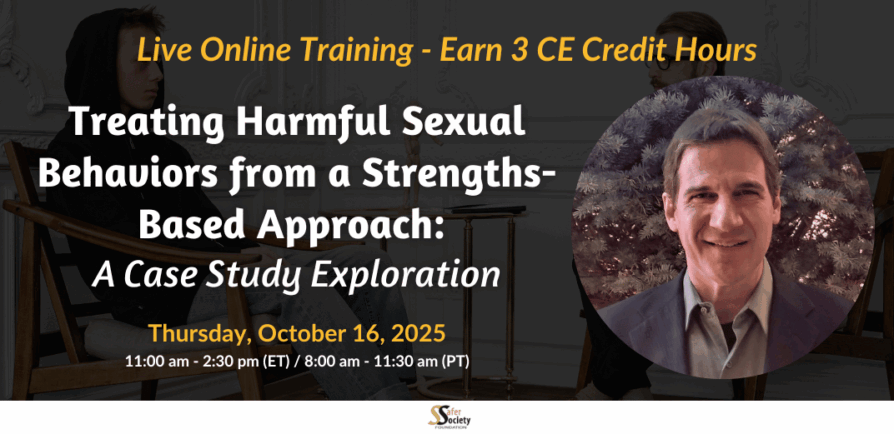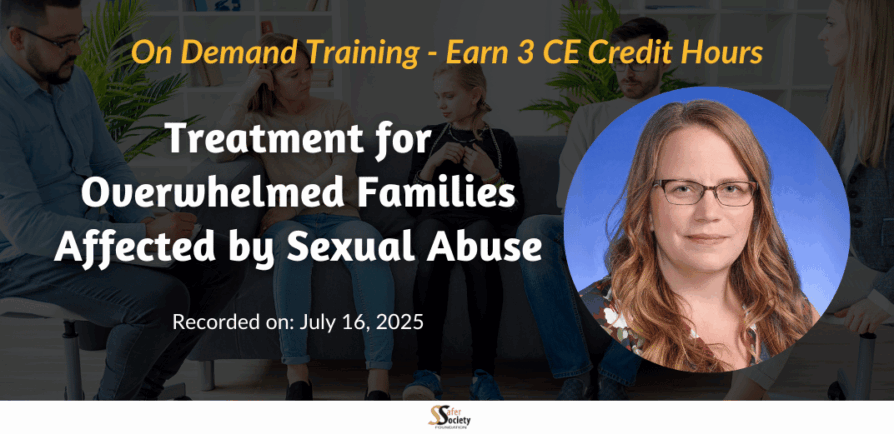In this training, Dr. Zachary Yeoman examines numerous aspects of LWC evaluations. He provides an overview of the legal contexts in which evaluators operate, helping them navigate areas where psychological science and the law may conflict.
Treating Harmful Sexual Behaviors from a Strengths-Based Approach: A Case Study Exploration
Strengths-based services for children, adolescents, families, and adults have become far more widely used in recent years. While much of this practice has been in response to trends in research, many professionals simply prefer to take a more positive, strengths-focused approach, particularly when working with adolescents who have caused sexual harm.
Dr. Kevin Powell has been a leading light in strengths-based work throughout his career, with an extensive record of publications and presentations on the subject. In this training, Dr. Powell describes a challenging case involving an adolescent mandated to receive sexual offense-specific treatment.
Supervising Professionals Who Work with Domestic Violence: Ethical Considerations
n this session, Ms. Garder explores common ethical dilemmas and provides guidance for delivering effective services to those working with domestic violence survivors and those who have caused harm. She also offers skills and tools for supervising clinicians, particularly clinicians with limited experience in domestic violence. Through case examples, interactive discussion, and actionable frameworks, attendees gain insight into the challenges of balancing their desire for client safety against the reality that predicting and stopping violence is outside the clinician’s complete control.
Talking About Sex in Sexual Offense Treatment: Practical Approaches for Professionals
Traditional approaches to sexual offense treatment focus on suppressing or controlling sexual urges, but research and clinical experience now emphasize the importance of promoting healthy sexuality as part of rehabilitation. For individuals with histories of sexual offending, addressing issues such as sexual dysfunction, negative self-image, intimacy problems, and deviant sexual scripts in treatment, can decrease the risk of reoffending.
Unfortunately, many professionals experience discomfort and other challenges when discussing sexual topics with clients, leading to avoidance or negative messaging about sex and sexuality. Consequently, clients may not receive the support they need to explore their sexual interests, develop healthy sexual expression, and achieve treatment goals related to consensual and non-harmful sexuality.
This presentation, developed by Nikole Nassen, PhD, focuses on how professionals can address sexual topics with adults in sexual offense treatment.
Treatment for Overwhelmed Families Affected by Sexual Abuse
In this training, Amanda Pryor explores methods and techniques for engaging families experiencing these challenges, while also addressing the professionals’ own feelings of being overwhelmed. This includes how to carefully redefine one’s approach when previous providers have not been helpful, such as by shifting from interventions that may unintentionally target parents to more inclusive family support methods.
By better using proven engagement techniques, professionals can guide families through difficult changes and ease their feelings of being overwhelmed. The training emphasizes the use of motivational interviewing specifically to foster a supportive environment during treatment. Additionally, it offers ideas on how to effectively assist family reunification efforts at times when families are facing pressures from outside agencies, financial strain, and other challenges.
Our Safe Haven: Navigating Sexuality Education Competency
In this Our Safe Haven, we invite you to join practitioner Robin Cooper and David Prescott to explore CSE as its own kind of cultural competence, particularly for professionals working with clients who have experienced or committed acts of violence and sexual abuse.
The session will begin with a focused review of a comprehensive sexuality education, evolving naturally into an engaging, attendee-driven conversation shaped by shared experiences and professional insights.
Using Sex Positivity in Clinical Practice to Improve Therapeutic Outcomes
For decades, the treatment of people who have sexually offended operated from a predominantly risk-focused perspective. That is, telling clients what they should not do sexually, rather than helping clients use approach goals to develop healthy outlets for their natural human sexual needs. While risk management remains important, clinical experience suggests that adopting a sex-positive approach can enhance clients’ therapeutic outcomes and support their long-term rehabilitation.
Understanding Child Sexual Grooming – Part 1: Beyond the Myths to the Reality
Misinformation surrounding the term “grooming” is widespread, and the term is often weaponized in public discourse, where it is suggested that children can be “groomed” quite quickly by even brief exposure to certain books, individuals, or media. In this first of three blog posts, we’ll take a look at what grooming really is, examine some ways it is carried out, and consider ways it can be prevented.
The misuse of the term not only distorts the true meaning of the act, but it also creates confusion and fear that can hinder real prevention efforts. This is why it is crucial to clarify what the term truly means and, just as importantly, what it does not mean.









